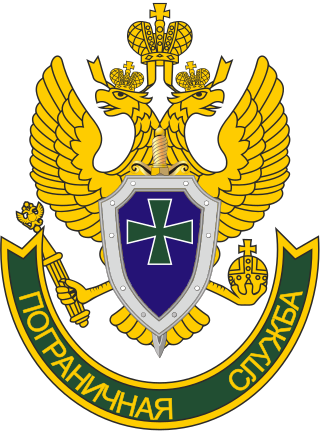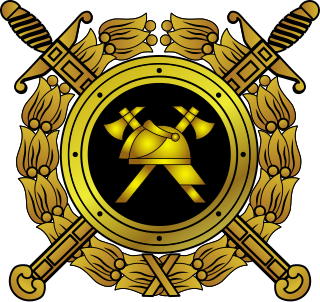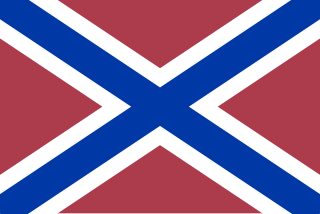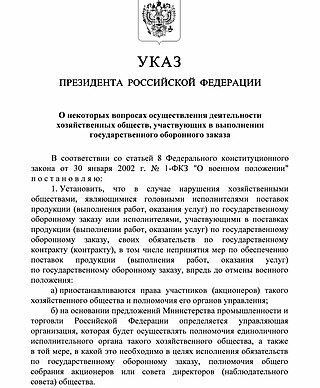
The Federal Protective Service, or the Federal Guard Service of the Russian Federation, official name in English Federal Guard Service of the Russian Federation, is a federal government agency concerned with the tasks related to the protection of several high-ranking state officials, mandated by the relevant law, including the President of Russia, as well as certain federal properties. It traces its origin to the USSR's Ninth Chief Directorate of the KGB and later Presidential Security Service (SBP) led by KGB general Alexander Korzhakov.

Internal troops, sometimes alternatively translated as interior troops or interior ministry forces, are military or paramilitary, gendarmerie-like law enforcement services, which are found mostly in the post-Soviet states, primarily Russia. Internal troops are subordinated to the interior minister of their respective countries.

The Border Service of the Federal Security Service of the Russian Federation is a branch of the Federal Security Service of Russia tasked with patrol of the Russian border.

Russian State Fire Service is the highest fire service body of Russian Federation. A part of the Ministry of Emergency Situations since 2001, the State Fire Service is divided into the Federal Fire Service and the Fire Service of the Federal subjects of Russia.

The State Border Service of Azerbaijan Republic is a governmental law enforcement agency in charge of protecting the borders of Azerbaijan. The Chief of State Border Service is Colonel-General Elchin Guliyev. Other law enforcement bodies in Azerbaijan include the Internal Troops of Azerbaijan and the Azerbaijani National Guard.

In the Russian Federation, law enforcement is the responsibility of a variety of different agencies. The Russian police are the primary law enforcement agency, with the Investigative Committee of Russia as the main investigative agency, and the Federal Security Service (FSB) as the main domestic security agency.

The Coast Guard of the Border Service of the FSB, previously known as the Maritime Units of the KGB Border Troops, is the coast guard of Russia.

The Special Communications and Information Service of the Federal Protective Service of the Russian Federation is a cryptologic intelligence agency of The Federal Protective Service of Russia responsible for the collection and analysis of foreign communications and foreign signals intelligence, as well as protecting Russian government communications and information systems, which involves information security and cryptanalysis/cryptography.

The National Guard of the Russian Federation, also known as the Rosgvardiya, is the national gendarmerie and internal military force of the Russian Federation, comprising an independent agency that reports directly to the President of Russia Vladimir Putin under his powers as Commander in Chief of the Armed Forces of the Russian Federation and Chairman of the Security Council.

The National Guard Forces Command of the Russian Federation is the operational gendarmerie component of the National Guard of Russia, created through a presidential decree on April 5, 2016. Functionally, it is a gendarmerie organized along paramilitary lines with a mission to ensure public order, national security and defense against terrorism. To this end, Forces Command handles the operational units of the National Guard, including its rapid deployment branch, the Separate Operational Purpose Division (ODON); and its naval branch, the National Guard Naval Service Corps.

The National Guard Naval Service Corps is the naval service, water police and coast guard branch of the National Guard Forces Command, National Guard of Russia. Formerly the Naval Service of the Internal Troops of Russia, it was established in 1978 through the fulfillment of a 1976 resolution of the Politburo of the Communist Party of the Soviet Union and a 1978 decree of the Council of Ministers of the Soviet Union.

The Federal Bailiff Service is a federal law enforcement agency of the Ministry of Justice of Russia.

The Federal Agency for Tourism (Rostourism) was a federal executive body of the Russian Federation, created by Presidential Decree No. 1453 of November 18, 2004 and dissolved on October 20, 2022. The Federal Agency for Tourism was responsible for rendering state services, managing state property and performing law-enforcement functions in the field of tourism. It was under the direct jurisdiction of the government of Russia. Activities of the Federal Agency for Tourism guided by the Constitution of the Russian Federation, Federal laws, Decrees of the President and the Government of the Russian Federation, and international treaties. The Federal Agency for Tourism carried out its activities in cooperation with other federal executive bodies, executive authorities of the subjects of the Russian Federation, local self-governing bodies, public associations and other organizations. The Federal Agency for Tourism was a legal entity, had a seal with the image of the State Coat of Arms of the Russian Federation and its name, other seals, stamp, and letterhead, as well as bank and other accounts opened. It received funding for its operation and project implementation from the federal budget. The agency head office was in Moscow.

The Special State Protection Service of Azerbaijan is a militarized institution that is under the direct command of the President of Azerbaijan. Since 2020, the organization has been headed by Baylar Eyyubov, a close associate of Azerbaijan's authoritarian ruler Ilham Aliyev.

The Ministry of Internal Affairs of the Republic of Kazakhstan is the Kazakh government ministry which oversees the police and the National Guard of Kazakhstan. The Ministry is headed by the Minister of Internal Affairs of the Republic of Kazakhstan, appointed by the decree of the President of Kazakhstan. The Minister of Internal Affairs has 5 deputies, including the First Deputy Minister.

Directorate of the President of the Russian Federation is a federal executive body that organizes and directly provides material and technical support and social, medical, and sanatorium and resort services for the activities of federal government bodies. Created on November 15, 1993, by Presidential decree No. 735-rp to replace Main Social and Industrial Administration of the Administration of the President of the Russian Federation (GSPU). Since August 2, 1995, it has the status of a federal executive body and as of 2013 employs 500 workers.

Martial law in Russia is defined in Russian law as a special legal regime that is introduced in conditions of external aggression or a threat of such. In this way, it differs from the state of emergency, which is introduced in the event of an internal threat such as an attempted coup, unrest or disaster. Martial law should also be distinguished from the State of War- a term that refers to the period between the outbreak of hostilities and their end. The procedure for introducing and abolishing martial law in Russia is defined in the federal constitutional law “On Martial Law” (2002). In modern Russia, martial law was introduced on 19 October 2022 during the 2022 Russian invasion of Ukraine in the annexed regions of Ukraine, which by then were unilaterally declared by the whole state apparatus to be new federal subjects of Russia.
The Russian Academy of Rocket and Artillery Sciences (RARAN) is a non-profit scientific organization of the Russian Federation. RARAN coordinates the activities of scientists who carry out complex research and development (R & D) on the creation, operation and use of modern weapons, military technology and special equipment. The Academy was established on April 5, 1994 by a decree of the RF President "in order to revive the traditions of Russian military science, and to develop scientific research in the country's defense complex". RARAN is the only scientific and expert organization in the power structures that has state status. It unites leading scientists and specialists from organizations of the Russian Ministry of Defense, other federal executive authorities and the defense industry. This union enables the solutions of problematic issues such as the systemic development of weapons and special military technology (VVST). According to its legal form, RARAN is a federal state budgetary institution. By the Decree of the RF Government on July 17, 1995 No. 715, RARAN was equated with branch academies. The principles of activity and its numbers were determined: 100 full members and 200 corresponding members. In addition, the charter provides for the possibility of electing honorary and foreign members. Since 2016, according to the decision of the board of the RF Military-Industrial Commission, RARAN was designated the head scientific organization for the Council of Chief Designers of the weapons systems of the Army. The President of the Academy was also appointed the head of this council.
Kometa Corporation is an enterprise of the Russian military-industrial complex specializing in the research, development, production and operation of space information management and intelligence systems.

VOKhR, VeCheka or The Internal Security forces of the Soviet Union was a paramilitary organisation that operated with Civilian, Military and Security force troops who worked in a separate section of the military and security forces for the internal security of the Soviet Union. They were designated as a paramilitary force tasked with protecting the internal security, communications, transportation and, guarding of borders and regions.

















